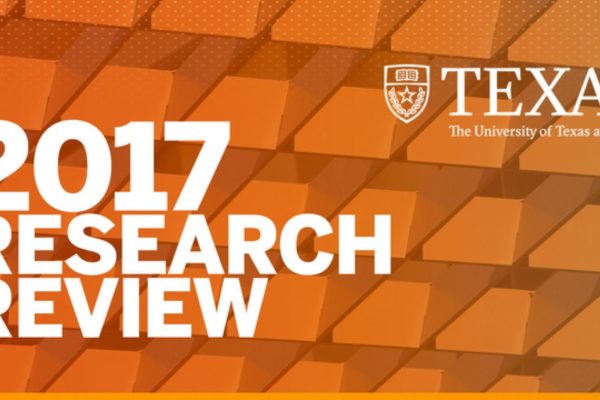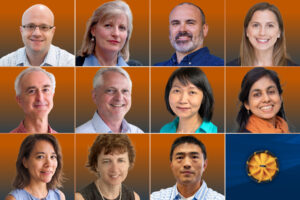You might have heard that at UT Austin, what starts here changes the world.
In fact, this year UT Austin ranked No. 17 in the world for scientific research among academic institutions, according to the Nature Index.
Here is some of the UT Austin research that captured the public imagination this year.
1. A Tool That Detects Cancer in Seconds

If you talk to cancer patients after surgery, one of the first things many will say is “I hope the surgeon got all the cancer out.” To improve the odds that all of a patient’s cancer is removed during surgery, a team of scientists and engineers led by chemistry professor Livia Eberlin invented a “cancer pen” that detects cancerous tissue in 10 seconds. The MasSpec Pen could be a game changer for cancer treatment by reducing the rate of cancer recurrence. Read More.
2. Your Smartphone is Draining Your Brain Power
Even when it’s silent or turned off, the mere presence of your smartphone impairs cognitive abilities, according to a study led by Adrian Ward, an assistant professor at the McCombs School of Business. In experiments with more than 500 smartphone users, his team found that people performed worse on tests when their smartphones were in the room than when they were not. Read More.
3. A Better Battery

John Goodenough, known as the father of the lithium-ion battery, which powers everything from mobile phones to electric cars, introduced another breakthrough battery technology this year – at 94 years old. The engineering professor led a team that developed a safer, cheaper, faster-charging solid-state battery that could store up to five times as much energy as current rechargeable batteries. The discovery fascinated the scientific community and drew the attention of industry heavyweights interested in commercializing the technology. Read More.
4. Planet Hunters Use AI to Discover New Worlds
In a discovery pushing the frontiers of both space exploration and artificial intelligence, for the first time, NASA discovered an eighth planet in another solar system. NASA teamed up with Google and UT Austin astronomer Andrew Vandenburg to use machine learning technology to analyze data from the Kepler Space Telescope. The discovery marks the first solar system to tie with our solar system in the number of planets orbiting one star and raised the prospect of gaining new insights into the universe by using computer programs that can crunch data faster than humans can. Read More.
5. Jesus’ Secret Teachings Discovered
Biblical scholars Geoffrey Smith and Brent Landau discovered the first-known original Greek copy of a forbidden Christian text describing Jesus’ secret teachings to his brother. The text was lost for 1,500 years before it was discovered in archives at Oxford University and is one of only a few early Christian texts found in their original Greek language. Read More.
6. Texas Bluebonnet Forecast

When a warm and wet winter pushed some of the state’s most iconic flora to bloom early this year, Texans were prepared. The Lady Bird Johnson Wildflower Center’s annual state wildflower forecast improved lives and Instagram feeds statewide when it put people on alert that the peak time for a Texan rite of passage – taking photos with the bluebonnets – would arrive sooner than usual, thanks to a warm February. Read More.
7. How Not to Talk to Kids About Weight
Shaming overweight adolescents does not encourage them to shed excess pounds, warned Stephen Pont, a professor of pediatrics at Dell Medical School, in a policy statement he authored for the American Academy of Pediatrics and The Obesity Society. In fact, stigma often contributes to unhealthy behaviors such as binge eating, inactivity and isolation, along with mental health issues, according to the report. Read More.
8. Tracking Texas Earthquakes In Real Time

Like many areas in the south-central United States, Texas has experienced an increase in the number of earthquakes during the past decade. The Bureau of Economic Geology at the Jackson School of Geosciences rolled out the most advanced state-run earthquake monitoring system in the country to aid understanding of earthquake patterns across Texas and help prevent earthquakes in the future. Thanks to an interactive online map, the TexNet Seismic Monitoring Program allows the public to follow seismic activity across the state in real time. Read More.




